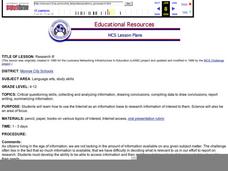Curated OER
Sow Bug Habitats
Learners conduct an experiment to determine what type of environment sow bugs prefer. They use petri dishes with partially wet paper towels to assess whether they prefer wet or dry habitats.
Curated OER
Introduction to the Barnegat Bay Estuary
Students research estuaries. For this estuaries lesson, students discuss the differences in a bay and an ocean. Students watch a PowerPoint of the properties of the estuaries and geography of Barnegat Bay. Students complete a worksheet...
Curated OER
Latex Helium Balloons: Any Alternatives?
Students discuss the latex balloon release controversy and review suggested alternatives to the latex balloon.
Curated OER
Honey ! I Blew Up The Bee!
Second graders complete a variety of bee-themed activities. They consider the importance of honeybees in food production, conduct Internet research, prepare foods using honey, complete puzzles and compile a portfolio of their work.
Curated OER
Land Biomes Research and Presentation
Fifth graders work in cooperative groups to research an assigned land biome using various sources. Groups create either a book or a PowerPoint presentation of their assigned land biome.
Curated OER
Cloning and Related Issues
Eighth graders research information on cloning and the surrounding issues online. They analyze the issues surrounding cloning and present their point of view with supporting details in a Powerpoint presentation.
Curated OER
The Everglades
Young scholars research the Everglades. In this Everglades lesson, students select an animal or plant to research and work collaboratively in small groups to prepare a presentation.
Curated OER
Observing Plants Through a Journal
First graders observe a plant, write about it, and illustrate their writing in a journal.
Curated OER
TE Activity: Built to Last?
Fifth graders test the shelters that were built in a prior activity. They determine the level of durability and water resistance of these shelters through a scientific investigation.
Curated OER
Virus Alert
Ninth graders explore the various types and replication patterns of viruses. Using an interactive web-based textbook, 9th graders research viruses and their replication patterns. When their research is complete, students use a drawing...
Curated OER
Weather Words
Third graders gather together as a class and share any facts or words about the science unit "Weather Elements". They listen to the story/poem, "Listen to the Rain" and recall any weather related words from the story.
Curated OER
Oceanography Research
Fifth graders locate information on a specific ocean animal using encyclopedias, nonfiction books, SIRS Discoverer, multimedia encyclopedias, and the Internet. They create an acrostic poem about the ocean animal they have been researching.
Curated OER
Presentation of Research with HyperStudio
Young scholars report information about a Michigan native animal in a Hyperstudio stack. They gain interest from the animals that they chose from lesson 1 by using the software.
Curated OER
Artificial Satellites and Space Probes
In this satellites worksheet, students match the list of facts given with the artificial satellite or space probe that it describes. This worksheet has 12 matching questions.
Curated OER
Water Taste Test
Students brainstorm the different characteristics of potable water. In this general science lesson, students test several water samples and hypothesize which samples and brands they are. They discuss where drinking water came from and...

















